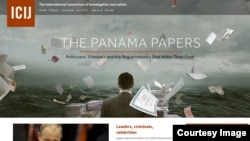The Panama Papers are likely to spark new prosecutions of people accused of providing funds to terror groups and boost political pressure to tighten financial rules in the United States. Experts say efforts to block terrorist financing are growing more effective, but some charities that work in war-torn areas say new rules are also hurting relief efforts.
Blocking funds to terror groups is vital because major attacks require money for explosives, weapons, travel and other expenses.
Terror groups use companies, including some in Panama, with hidden ownership to keep authorities from finding out that some funds are headed for organizations intent on violence, according to sanctions expert Eric Lorber of the Financial Integrity Network. “We know from the Panama Papers that there were terrorist organizations that were setting up these shell companies - Hezbollah for example.”
Former Senator Carl Levin has been pressing Washington for years to end secrecy in shell corporations in a bid to hamper terror financing, drug smuggling, tax evasion and corruption. He urged policymakers to seize the political power growing out of public anger over this episode. He warned former colleagues not to let the scandal “go to waste.”
But tighter financial rules have some side effects, according to Michael Rubin, an economist at the American Enterprise Institute. He says scrutiny is prompting terror and criminal groups to use older, slower methods of moving money. He says that is a “major concern” because these traditional methods are much harder for law enforcement to track. “The money changer in Mogadishu or the money changer in Tehran, how are they getting their money? Is it coming in suitcases rather than are they hiding it offshore in Panama?”
Another side-effect comes as many banks are abruptly closing accounts for charities collecting money to help people in war-torn areas. Such nations in conflict are often the target of economic sanctions, and some banks have paid large fines after violating sanctions rules. And in the past, some charities were used to camouflage the destination of funds headed for terror groups.
Problems for charities
That is causing serious problems for legitimate charities that raise money for people in some of the most difficult places on earth, charities that find themselves without access to banks and unable to pay staff and meet other expenses.
Sam Worthington, CEO of InterAction, a group of charities that work in troubled places, calls such “de-risking” and “de-banking” a growing problem. “It's now to a point where a lot of the major Muslim-based charities in the U.S. that work internationally are one bank away from going out of business, which would drive all the money underground.”
High risk and low reward makes banks reluctant to have anything to do with organizations working in areas that might prompt extra official scrutiny.
While many experts say the international community has a lot of work to do to keep up with the fast-evolving methods used by terror and criminal groups, Lorber says over the past 15 years there has been a “real beefing up …of the ability to combat terrorism financing, both by tracing it and then also by seizing terrorist assets.” He says 20 or 30 years ago terrorists could “easily” pass funds through the financial system, but it is now “much much more difficult to do” though it remains “a game of cat and mouse.”
United Nations Under-Secretary-General for Political Affairs, Jeffrey Feltman, says stopping terror groups will require U.N. member states to do a better job of exchanging information and financial intelligence and strengthen coordination with private companies.
He says some terror groups tax residents of territory they control, loot archeological sites, kidnap people for ransom and raise donations through social media and other means.
In Washington, Senate Banking Committee member Elizabeth Warren urges the Treasury Department to step up investigations.
Treasury Secretary Jack Lew says a “stepped-up” strategy to confront terror financing has been put in place over the past year, while Justice Department officials say they are reviewing information from the Panama Papers.














